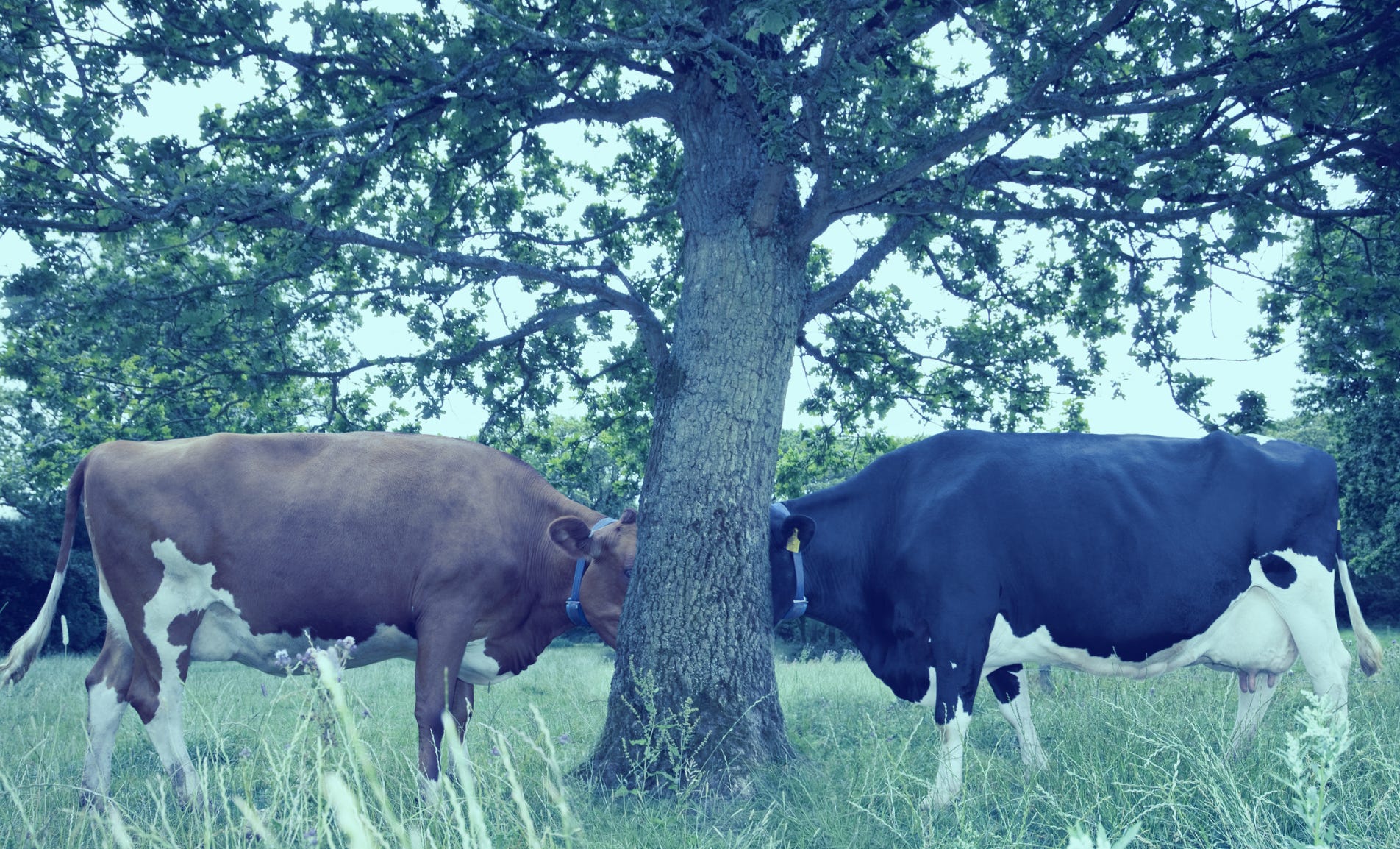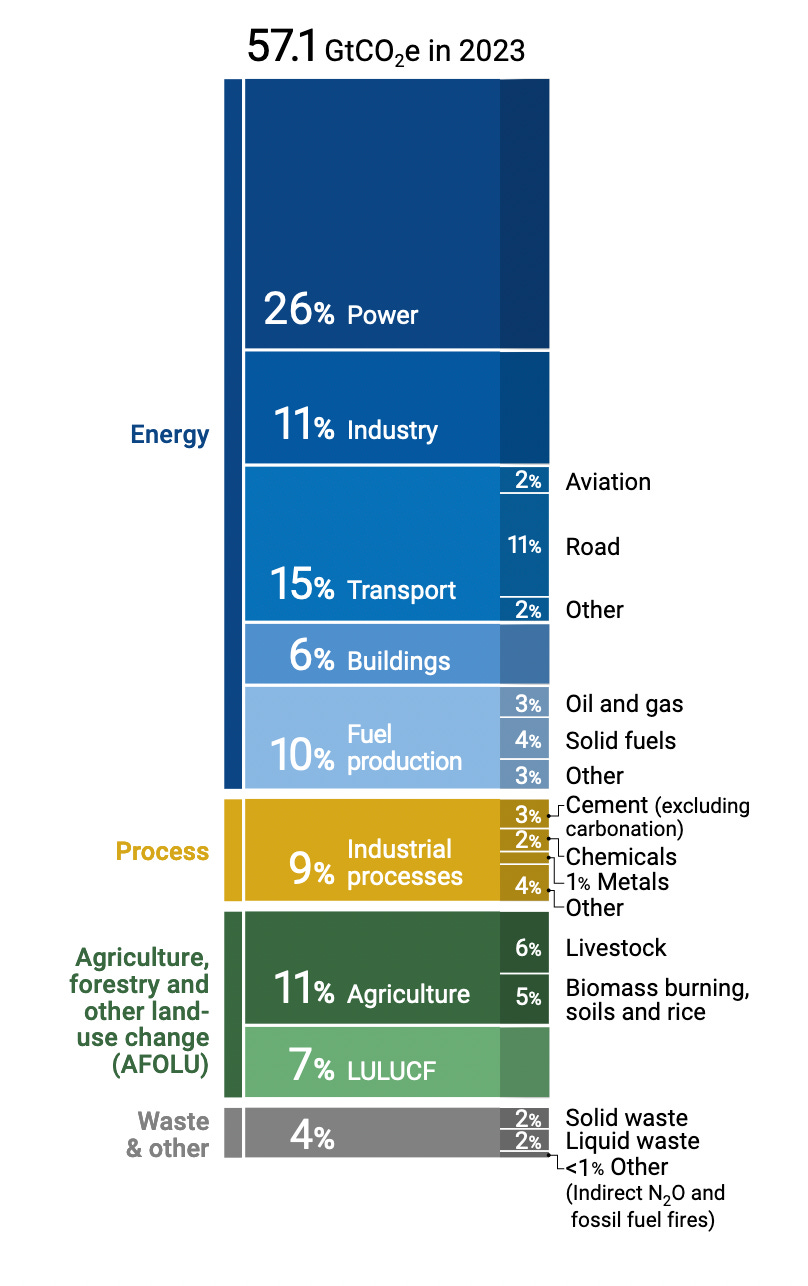U.N. report obscures meat’s true climate impact
Hi there—Arielle here. As you might have seen this week, bad things happen when billionaires control the news. We rely on readers, and readers only, to fund our work—which keeps us beholden only to our community. We hope you’ll consider joining the thousands of people who keep billionaire-free climate journalism alive by becoming a paid subscriber today. U.N. report obscures meat’s true climate impactBy measuring only direct emissions, the U.N. unintentionally makes a massive polluter look much more innocent than it is.A United Nations climate report made headlines last week with a stark warning: the planet is on track to heat by 2.6 to 3.1 degrees Celsius within the century. The Emissions Gap Report says world leaders have continuously failed to fulfill their climate pledges for nearly a decade, thereby putting ecosystems and the economy at risk of irreversible damage. This lack of progress is by far the most critical conclusion of the U.N.’s 100-page report—especially considering that, in one month, world leaders will make a new set of climate pledges at the U.N. annual climate summit in Azerbaijan. But during my own read-through, I also noticed something about the report that felt worthwhile to highlight: it seems to seriously undercount the climate impact of livestock, one of the most polluting parts of the global economy. So I reached out to one of the lead authors on the report, as well as some of my most trusted sources on animal agriculture researchers, to find out why. Solving a meat mysteryIn a graphic at the beginning of the report, the U.N. estimates that in 2023, livestock was responsible for only 6 percent of global greenhouse gas emissions. The number struck me as strange. Because in my previous reporting on animal agriculture, I’ve found that livestock—particularly cattle—are responsible for anywhere from 11 to 20 percent of global emissions, according to a range of peer-reviewed studies. Seeing this, I immediately considered that industry influence could be to blame. Because like the fossil fuel industry, the animal agriculture industry has a history of pressuring the scientific community to downplay its role in the climate crisis. The industry has recently censored U.N. reports on livestock emissions; pressured the IPCC to remove recommendations to shift to “plant-based diets” from its most recent report; and sent lobbyists to COP28 to convince policymakers that meat is beneficial for the environment. What I found, however, was more an issue of scientific choice. According to Taryn Fransen, global climate program director at the World Resources Institute and one of the report’s lead authors, the U.N. report only measures direct, or Scope 1, emissions. This includes methane from cow burps, manure, and fertilizer. It doesn’t include indirect, or Scope 2 or 3 emissions for livestock: things like deforestation, growing feed, pasture management, and slaughterhouse waste. Fransen said they counted direct emissions because it’s more straightforward than counting every polluting part of the meat industry, what scientists call “full lifecycle emissions.” That full lifecycle reveals an industry’s true climate impact, but it can lead to complications at a global level. “You will end up double counting things because the full lifecycle emissions are also going to include emissions that we're counting under transport, or we're counting under land use,” said Fransen. She noted that many other scientific organizations track only direct emissions, including the IPCC, the European Commission’s Emissions Database for Global Atmospheric Research (EDGAR), the Global Carbon Project, and more. But the straightforward scientific explanation can make things more confusing for the general public. Only counting direct emissions “can miss a large part of the equation,” said Matthew Hayek, assistant professor of environmental studies at New York University. For example, expanding cattle pasture land is responsible for 41 percent of tropical deforestation; but deforestation emissions are in a separate category under land use, land-use change and forestry (LULUCF). “The undercounting problem is especially significant for livestock,” Hayek said. But other sectors are affected, too. Indeed, by relying solely on direct emissions to measure impact, the U.N. and other scientific agencies may be unintentionally obscuring the actual climate impact of all industries. While relying on direct emissions alone may be easier to accomplish, and genuinely useful in the scientific community, it’s a poor communication tool for the broader public. It results in massive polluters looking much more innocent than they actually are. “I think the range of relative percentages presented does start to confuse the public,” said Jennifer Jacquet, a professor of environmental science at the University of Miami. And counting some emissions sources, while leaving out others, is not truly objective—especially when an industry funds influencers, academics, and PR groups to mislead the public about its true climate impact. “These are political choices,” she said. “These are political choices”How much the livestock sector emits is ultimately less powerful than how much it needs to stop emitting to preserve a livable climate. That number is much higher—the industry needs to cut its pollution by 25 percent in the next six years. There are a variety of ways to achieve that reduction, including: helping cows burp less through special feed or selective breeding; cutting down less trees for cropland or pastures; making livestock more productive; and replacing meat with lower-carbon meat alternatives. But the main way to cut livestock emissions is for wealthy countries to produce and consume less meat and dairy. At an individual level, switching from beef and lamb to less-polluting animal products—like chicken, pork, and eggs—helps make a difference. Fransen acknowledged that a 25 percent reduction is a huge leap. But by publishing these gaps before COP29, she hopes that world leaders will commit to the specific emission reductions in time to prevent a climate catastrophe. “The climate has limits, and we're running up against them,” she said. “And the longer we wait to take serious action, the steeper and more implausible these numbers are going to look.” More takeaways from the U.N.’s report:
Further reading:
Catch of the day: Tindy knows the importance of monsoon season in her northern New Mexico neck of the woods (and how to look like she’s wearing an adorable tutu). Reader Paula says that one time when she was bemoaning the failure by political leaders everywhere to end destructive wars, end subsidies to fossil fuel companies, and take climate change seriously, Tindy looked up as if she were praying for moisture. Want to see your furry (or non-furry!) friend in HEATED? Send a picture and some words to catchoftheday@heated.world. You're currently a free subscriber to HEATED. For the full experience, upgrade your subscription. |
Older messages
How bad could Trump be for renewables?
Thursday, October 24, 2024
A previously unreported study predicts a massive decrease in solar, wind, and battery development if Trump adopts just one proposal in Project 2025. ͏ ͏ ͏ ͏ ͏ ͏ ͏ ͏ ͏ ͏ ͏ ͏ ͏ ͏ ͏ ͏ ͏ ͏ ͏ ͏ ͏ ͏ ͏ ͏ ͏ ͏
Microplastics! They're everywhere!
Sunday, October 20, 2024
An unhinged list of places scientists have found microplastics—including dolphin breath. ͏ ͏ ͏ ͏ ͏ ͏ ͏ ͏ ͏ ͏ ͏ ͏ ͏ ͏ ͏ ͏ ͏ ͏ ͏ ͏ ͏ ͏ ͏ ͏ ͏ ͏ ͏ ͏ ͏ ͏ ͏ ͏ ͏ ͏ ͏ ͏ ͏ ͏ ͏ ͏ ͏ ͏ ͏ ͏ ͏ ͏ ͏ ͏ ͏ ͏ ͏ ͏ ͏ ͏ ͏ ͏
Keep yelling about climate change
Tuesday, October 8, 2024
It can feel demoralizing in the face of delay, but new peer-reviewed research suggests it's not always in vain. ͏ ͏ ͏ ͏ ͏ ͏ ͏ ͏ ͏ ͏ ͏ ͏ ͏ ͏ ͏ ͏ ͏ ͏ ͏ ͏ ͏ ͏ ͏ ͏ ͏ ͏ ͏ ͏ ͏ ͏ ͏ ͏ ͏ ͏ ͏ ͏ ͏ ͏ ͏ ͏ ͏ ͏ ͏
Why Chevron is sponsoring Hurricane Helene journalism
Friday, October 4, 2024
The oil giant wants to convince the public that its new ultra-high-pressure offshore drilling project, Anchor, is climate-friendly. ͏ ͏ ͏ ͏ ͏ ͏ ͏ ͏ ͏ ͏ ͏ ͏ ͏ ͏ ͏ ͏ ͏ ͏ ͏ ͏ ͏ ͏ ͏ ͏ ͏ ͏ ͏ ͏ ͏ ͏ ͏ ͏ ͏ ͏ ͏
JD Vance’s cowardly climate denial
Wednesday, October 2, 2024
Amid unprecedented destruction from Helene, Vance was too afraid to tell Americans what he actually believes. ͏ ͏ ͏ ͏ ͏ ͏ ͏ ͏ ͏ ͏ ͏ ͏ ͏ ͏ ͏ ͏ ͏ ͏ ͏ ͏ ͏ ͏ ͏ ͏ ͏ ͏ ͏ ͏ ͏ ͏ ͏ ͏ ͏ ͏ ͏ ͏ ͏ ͏ ͏ ͏ ͏ ͏ ͏ ͏ ͏ ͏
You Might Also Like
Win Two Tickets To A Major Music Festival & A Shopping Spree!
Thursday, February 27, 2025
Thanks To Marshalls. Feb. 27, 2025 Bustle Daily Enter To Win Tickets To A Major Music Festival, Thanks To Marshalls Presented by Marshalls Enter To Win Tickets To A Major Music Festival, Thanks To
Cat Story
Thursday, February 27, 2025
How we got that cat ͏ ͏ ͏ ͏ ͏ ͏ ͏ ͏ ͏ ͏ ͏ ͏ ͏ ͏ ͏ ͏ ͏ ͏ ͏ ͏ ͏ ͏ ͏ ͏ ͏ ͏ ͏ ͏ ͏ ͏ ͏ ͏ ͏ ͏ ͏ ͏ ͏ ͏ ͏ ͏ ͏ ͏ ͏ ͏ ͏ ͏ ͏ ͏ ͏ ͏ ͏ ͏ ͏ ͏ ͏ ͏ ͏ ͏ ͏ ͏ ͏ ͏ ͏ ͏ ͏ ͏ ͏ ͏ ͏ ͏ ͏ ͏ ͏ ͏ ͏ ͏ ͏ ͏ ͏ ͏ ͏ ͏ ͏ ͏ ͏ ͏ ͏ ͏ ͏ ͏ ͏
Selena Gomez Just Won The Red Carpet At The 2025 BAFTAs In An Iconic Gown
Thursday, February 27, 2025
WOW. The Zoe Report Daily The Zoe Report 2.16.2025 Selena Gomez Won The Red Carpet At The 2025 BAFTAs In An Iconic Gown (Red Carpet) Selena Gomez Won The Red Carpet At The 2025 BAFTAs In An Iconic Gown
"European" Means "I Want To Walk"
Thursday, February 27, 2025
When we mistake concrete ideas for abstract ones ͏ ͏ ͏ ͏ ͏ ͏ ͏ ͏ ͏ ͏ ͏ ͏ ͏ ͏ ͏ ͏ ͏ ͏ ͏ ͏ ͏ ͏ ͏ ͏ ͏ ͏ ͏ ͏ ͏ ͏ ͏ ͏ ͏ ͏ ͏ ͏ ͏ ͏ ͏ ͏ ͏ ͏ ͏ ͏ ͏ ͏ ͏ ͏ ͏ ͏ ͏ ͏ ͏ ͏ ͏ ͏ ͏ ͏ ͏ ͏ ͏ ͏ ͏ ͏ ͏ ͏ ͏ ͏ ͏ ͏ ͏ ͏ ͏ ͏ ͏ ͏
Sketched Buk Brings the Brilliance of Gold to Bangkok
Thursday, February 27, 2025
Thailand's Buk overcomes challenges to make glass gilding an important part of his design practice. BLAG Magazine: Adventures in Sign Painting Craft, Community & Culture Sketched Buk Brings the
Have You Seen the Panda Cam? 🐼
Thursday, February 27, 2025
— Check out what we Skimm'd for you today February 17, 2025 Subscribe Read in browser Header Image But first: the best Presidents Day sales to shop today Update location or View forecast
“The Lord is American” by W. J. Lofton
Thursday, February 27, 2025
The world undresses / its wounds. It wounds. ͏ ͏ ͏ ͏ ͏ ͏ ͏ ͏ ͏ ͏ ͏ ͏ ͏ ͏ ͏ ͏ ͏ ͏ ͏ ͏ ͏ ͏ ͏ ͏ ͏ ͏ ͏ ͏ ͏ ͏ ͏ ͏ ͏ ͏ ͏ ͏ ͏ ͏ ͏
Jeff Bezos Makes a Damning Case Against Corporate Media
Thursday, February 27, 2025
The decision to exile dissenting views from the Post opinion pages shows he puts Amazon's business over journalism ͏ ͏ ͏ ͏ ͏ ͏ ͏ ͏ ͏ ͏ ͏ ͏ ͏ ͏ ͏ ͏ ͏ ͏ ͏ ͏ ͏ ͏ ͏ ͏ ͏ ͏ ͏ ͏ ͏ ͏ ͏ ͏ ͏ ͏ ͏ ͏ ͏ ͏ ͏ ͏ ͏
Fit Is Better Than Thin
Thursday, February 27, 2025
The fit versus fat debate, cold plunging, new tech and your recommendations. ͏ ͏ ͏ ͏ ͏ ͏ ͏ ͏ ͏ ͏ ͏ ͏ ͏ ͏ ͏ ͏ ͏ ͏ ͏ ͏ ͏ ͏ ͏ ͏ ͏ ͏ ͏ ͏ ͏ ͏ ͏ ͏ ͏ ͏ ͏ ͏ ͏ ͏ ͏ ͏ ͏ ͏ ͏ ͏ ͏ ͏ ͏ ͏ ͏ ͏ ͏ ͏ ͏ ͏ ͏ ͏ ͏ ͏ ͏ ͏ ͏ ͏
Why Does The Bad Guy Feel Like The Victim?
Thursday, February 27, 2025
Thoughts on the psychology of sympathizing with petty wrongdoers ͏ ͏ ͏ ͏ ͏ ͏ ͏ ͏ ͏ ͏ ͏ ͏ ͏ ͏ ͏ ͏ ͏ ͏ ͏ ͏ ͏ ͏ ͏ ͏ ͏ ͏ ͏ ͏ ͏ ͏ ͏ ͏ ͏ ͏ ͏ ͏ ͏ ͏ ͏ ͏ ͏ ͏ ͏ ͏ ͏ ͏ ͏ ͏ ͏ ͏ ͏ ͏ ͏ ͏ ͏ ͏ ͏ ͏ ͏ ͏ ͏ ͏ ͏ ͏ ͏ ͏ ͏ ͏



